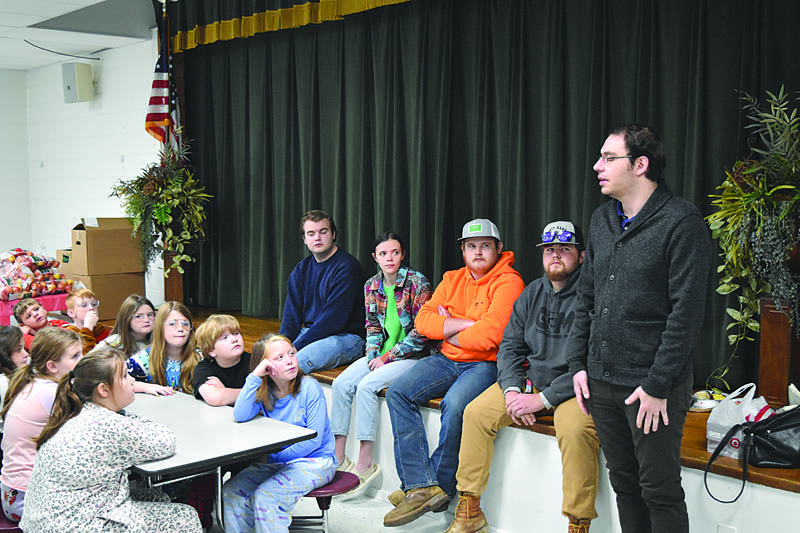Briceville Scholarship Day is a trip down memory lane
IN THE LIGHT

Kyle Leinart (standing) talks with Briceville Elementary School students during Coal Creek Watershed Foundation Scholarship Day recently. Also speaking at the event were scholars Ian Campbell, Madison Braden, Benny Foster and Sean Foster (seated, from left). (photo:Ken Leinart )
What is the best, the most meaningful way to describe what happens during a Coal Creek Scholarship Day event at Briceville Elementary School?
What makes it such a special day?
While the breakfast is yummy, the kids (fourth and fifth graders) are excited, the recipients of the scholarships are also excited, appreciative, and nervous – after all, they are the speakers – and it is a trip down memory lane for a lot of staff at the school.
But there is something else, something you can’t define with a speech, a story, or scrapbook packed full of photos.
Because you can’t define it, no matter how hard you try, or how desperate your heart wants you to.
Whether this annual event is held in a classroom, the school library, or the cafeteria one thing always marks the occasion: Hope is planted.
And hope is … Well, hope is hard to come by sometimes.
Briceville, the heart of what was once a thriving coal mining area in the north of Anderson County, is considered to be an economically depressed area.
That’s nice-speak for a lot of folks being poor.
The big coal mines are gone. There’s no industry nearby taking up the slack. For years Briceville had been denigrated and disparaged, its inhabitants a source of scorn, their children thought to be ignorant and backward.
Done so by people who didn’t know them. Done so by people who were too small-minded to understand and/or appreciate the heritage, the lineage, of the people who live in this small town.
Some 23 years ago The Coal Creek Watershed Foundation started changing that.
They didn’t do it – “They” being Barry Thacker, Carol Moore, the late Rev. Roy Daugherty, and others – because it was hip and cool and maybe someone would name a bar drink after them.
“Yes, I want a Barry Bourbon, please.”
“I want a Righteous Roy on the rocks.”
And, yes, they did seek attention, but it wasn’t a “pat us on the back” attention.
It was a, “Let’s set the record straight,” attention.
Good, meaningful, worthwhile, attention. Attention with value.
Words and pictures. Not a lot of worth in those two commodities these days.
Yet, so important when spreading the news about what is happening in the former coal mining region of North Anderson County.
But as always, actions speak so much louder than words. Check out the Coal Creek Watershed website if you want to see how action makes a difference.
Enough of that, back to the 22nd Coal Creek Watershed Foundation Scholars Day at Briceville Elementary School, Dec. 14, 2023.
“When did we start this?” Carol Moore asked. “It was a year after our first scholarships …”
“First scholars were announced in 2020?” Barry Thacker answered.
“So this is the 22nd,” they said – almost in unison.
The exact dates, times, days of the week ... All that noise is not as important as the fact that it is happening.
Again.
On this particular day with these particular scholars with these particular students and the message is the same: Dream big. Work Hard. Do the first two and we will help you. Because you are worth your effort, their effort, and our (The Watershed and Briceville staff) effort.
The first thing you have to understand is The Coal Creek Watershed Foundation is not offering free lunches, because there is no such thing as a free lunch.
You work hard, you keep up your grades, you achieve, you pay it forward.
The first scholar was Amy Dugger. She attended Lincoln Memorial University and received her master’s degree in social work from the University of Tennessee - Knoxville.
Her contribution to society goes way beyond that, however. As a Coal Creek Scholar who repeatedly attended the Scholar’s Day event at Briceville Elementary School she handed out a bouquet of hope with every visit.
See, fourth and fifth graders don’t know what they want to be when they grow up. Not those at Briceville Elementary School.
Not then.
Kyle Leinart didn’t have a clue what he wanted to grow up and be when he heard the first Coal Creek Scholar speak to his class.
“She (Amy Dugger) basically saved my life,” he said.
“I had no idea what I wanted to do when I was here. I love this place, but at the same time I thought, ‘You gotta go, you gotta get out of here, you gotta find a life and go on a journey,’” he said.
He found the, “How,” then he just had to put in the work.
“You gotta go to school. I didn’t know what I wanted to do, I just knew I needed to do something,” he added.
He went to Tennessee, worked, got married, worked some more, realized he wanted to learn more, received his master’s from Georgia Tech this past spring, and now works for the second largest company on the planet – Microsoft.
“But you don’t have to go to a university,” he said. “You can go to a trade school, be a craftsman, whatever. You have to do what makes you happy.”
As the song goes, Leinart’s future is so bright it has to wear shades. Who knows what’s on the horizon for Kyle Leinart? He knows part of it.
“I’ll come back here every year as long as I’m able,” he said.
Going to a university is not the hope and dream of all Coal Creek Scholars.
Sean Foster said he had no idea what he wanted from life when he attended Briceville Elementary School.
“I may have been in middle school when I realized I wanted to do better for myself,” he said.
But, he added, he didn’t think going to a university was part of that plan.
It’s not always a straight road, these life plans. Sometimes you have to wander a bit, maybe work at a job you hate, or maybe even know somebody who works at a job they hate, to realize you want something more.
Then he remembered the opportunity, the hope, given through the Watershed Scholarship program.
He graduated from Anderson County High School then attended Tennessee College of Applied Technology (TCAT) in Jacksboro and learned to weld. Now he’s a member of the Local 384 Iron Worker’s Union, pulling down some serious dollars working at Y-12.
As a bonus, he loves what he does.
“That’s the message, follow your dreams because you can do anything you want to do,” he said.
But he always remembers to come back to Briceville and tell the students to dream hard, work harder.
Finishing a program that, Sean said, goes at a student’s pace, he completed his welding certificate in eight months.
Hope also means grabbing the opportunity in a headlock and not letting go.”When I was younger I never thought I’d be a welder,” he said. “But when I realized it was something I wanted to do, the scholarship made it possible.””When I was younger I never thought I’d be a welder,” he said. “But when I realized it was something I wanted to do, the scholarship made it possible.”
Yeah, that and a little hard work. Benny obtained his bachelor’s and master’s in five years through hard work and will power.Yeah, that and a little hard work. Benny obtained his bachelor’s and master’s in five years through hard work and will power.
Sean’s brother, Benny, is also a Watershed Scholar.
His path is different, but the same.
“I had no idea what I wanted to do until I was a junior or senior in high school,” the ACHS graduate said.
But he found out.
After earning a bachelor’s degree, then his master’s, from The University of Tennessee - Knoxville, he is a structural engineer with a firm in Lexington, Ky.
“Sometimes you don’t know right away what you want,” he said. He designs buildings for industrial use.
Carol Moore said it was “funny” that Benny can design a building and Sean can build it.
Moore pointed out that during the COVID lockdown Benny didn’t waste his time playing video games and goofing off.
“He spent his time studying, cramming knowledge in, and it paid off,” she said. “He finished his degree early.”
Scholar Ian Campbell had a bit of a cheat sheet when it came to understanding the importance of the Coal Creek Watershed Foundation Scholarship.
“It’s our future to obtain. We can go to school and I can be successful,” Campbell said.
Campbell has one semester left at Tennessee Tech to obtain a degree in biology with an emphasis on zoology. His pathway to realizing what a Coal Creek Watershed Foundation Scholarship can do for you was made easier due to older sisters Sydney and Samantha – previous scholarship awardees.
“We had encouraging parents. I was always told I could achieve what I wanted to achieve, but I had to work for it.,” he said.
“Barry and Carol made it possible to realize we can go to school and be successful, that we could go ahead and work for it, to do it.”
It may be in part to another Coal Creek Watershed project, the Coal Creek Watershed Health Day (where students learn about the diversity and health of species in and around Coal Creek) that Campbell decided he wants to work with conservation. Work with preserving and protecting the environment.
Madison Braden is starting her third year at Lincoln Memorial University.
She has a firm plan on what she wants to do. She’s met her future husband. She knows what she wants to do and being a Watershed Scholar has helped her realize that.
This year’s scholar’s day was her second, but it won’t, she said, be her last.
“When I would hear the scholars come in and talk, I realized I would be okay,” she said. That just because she was in little ole Briceville Elementary didn’t mean the world didn’t have a place for her.
Because she gained hope.
And hope means work – enough work that going
sweat-free through the application process was not an option.
“When I was a junior in high school I started really paying attention,” she said. She even turned in material needed for the process of getting the scholarship six months prior to the deadline.
“I was so nervous,” she said.
She is studying special education/elementary education and she wants to come home and teach at Briceville Elementary.
There are some 60-plus Coal Creek Watershed Scholarship recipients making a positive contribution to society today.
Some are in the workforce. Some are still studying and will join the workforce. Some are still deciding what area of life they want to take on.
Just how will they make a difference?
All have, or will, take part in a Coal Creek Watershed Scholar’s Day at Briceville Elementary School.
That’s part of the requirement.
It’s part of paying it forward.
It’s part of letting the next generation understand there are no free lunches and that achieving means working.
It’s about sharing hope.
And it’s about believing in yourself and your future.


